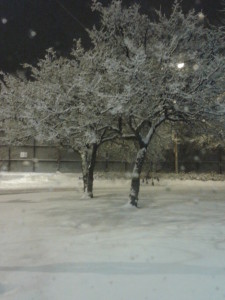
We sometimes forget how big a role the weather plays in the economy. Robert Gordon has argued that air conditioning has had a greater economic effect than the Internet; air conditioning made such major cities as Atlanta and Houston habitable during the summer, while the Internet just took away the margin of retail bookstores. GDP creeped along in the first quarter by 0.1%; it was too cold and snowy for people to go out and spend money.
Thanks in part to central heating and air conditioning, we sometimes like to think that we are impervious to weather. Sure, we’re not like subsistence farmers in Togo, where the rainfall determines how well people will eat in the next year. But even in Chicago, there’s a limit to how much cold people can take before they choose to stay inside. Even ordering out for food is off the table, as it’s cruel to make anyone go outside for any reason.
If people don’t go out, they don’t spend money. It’s as simple as that.
Much of our economic growth in the last century has come from our ability to control the effects of weather in our favor: to drive to work rather than walk in a downpour; to work in a comfortable office in August and February alike; to bring in fresh fruit from anywhere in the world any time of year. With climate change, the effects of weather are now less and less in our control. And so, people will be staying in more and spending less.
Here in Chicago, the summer is expected to be cool, and that’s all right. But it will probably be followed by another brutal winter, and that isn’t. And who needs new winter clothes to spend months indoors, under a blanket, watching Swedish murder mysteries on Netflix?


